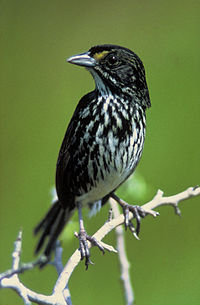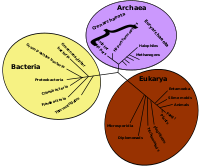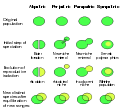Portal:Evolutionary biology
Introduction
Selected article -Alfred Russel Wallace OM FRS (8 January 1823 – 7 November 1913) was an English naturalist, explorer, geographer, anthropologist, biologist and illustrator. He independently conceived the theory of evolution through natural selection; his 1858 paper on the subject was published that year alongside extracts from Charles Darwin's earlier writings on the topic. It spurred Darwin to set aside the "big species book" he was drafting and quickly write an abstract of it, which was published in 1859 as On the Origin of Species. Wallace did extensive fieldwork, starting in the Amazon River basin. He then did fieldwork in the Malay Archipelago, where he identified the faunal divide now termed the Wallace Line, which separates the Indonesian archipelago into two distinct parts: a western portion in which the animals are largely of Asian origin, and an eastern portion where the fauna reflect Australasia. He was considered the 19th century's leading expert on the geographical distribution of animal species, and is sometimes called the "father of biogeography", or more specifically of zoogeography. (Full article...)General images -The following are images from various evolutionary biology-related articles on Wikipedia.
Selected picture - Orange Band, the last Dusky Seaside Sparrow died in 1987 in a captive facility in the Walt Disney World Resort Did you know... -
CategoriesRelated portalsTasks you can do
Related topicsWikiProjectsWikiProjects connected with biology: A complete list of scientific WikiProjects can be found here. See also Wikispecies, a Wikimedia project dedicated to classification of biological species. Associated WikimediaDiscover Wikipedia using portals |































![Image 30A covalent adduct between the metabolite of benzo[a]pyrene, the major mutagen in tobacco smoke, and DNA (from Mutation)](http://upload.wikimedia.org/wikipedia/commons/thumb/d/d8/Benzopyrene_DNA_adduct_1JDG.png/87px-Benzopyrene_DNA_adduct_1JDG.png)


















